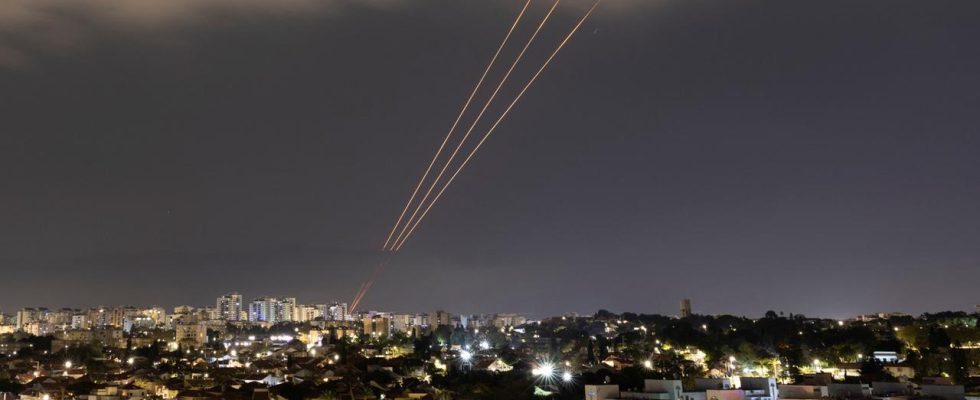During the night, Iran made good on its threat and attacked Israel with hundreds of drones and missiles. Almost all of them were intercepted. The G7 states and the UN Security Council meet for consultations.
During the night, Iran attacked Israel directly from its territory for the first time with drones and missiles. Sirens wailed across the country. According to the Israeli army, rocket alarms were triggered in the south, the Dead Sea, the greater Jerusalem area and the north of the country, among other places.
There was an alarm in Jerusalem at around 1:45 a.m. local time. Light streaks could be seen across the city’s sky and explosions from intercepted missiles could be heard. Citizens were asked to seek safety in shelters.
In the morning, the military announced that the attack had been “foiled”. Israeli media report that 99 percent of around 300 ballistic missiles and drones were intercepted by Israel, the USA, Great Britain and Jordan – some of them already over Syria and Jordan.
Shelling also comes from Lebanon and Yemen
In addition to the missiles from Iran, the Lebanese Hezbollah militia also said it fired rockets at an Israeli military base. In addition, according to media reports, the radical Islamic Houthis from Yemen took part in the attacks. According to army spokesman Daniel Hagari, their bullets did not reach Israel.
According to information from ARDCorrespondent Christian Limpert is said to have injured a total of 31 people in the attacks, including a seven-year-old girl seriously.
Netanyahu: We will win
Earlier in the morning, Israel’s Prime Minister Benjamin Netanyahu said on the online platform X: “We intercepted. We blocked. Together we will win.”
The Israeli military then also gave the all-clear. The airspace over Israel has been reopened by the authorities
In the meantime, the airspace over Israel, Lebanon, Jordan and Iraq had been closed. Israel and Jordan have now reopened them. In Syria, anti-aircraft systems were activated around Damascus and at several military bases, presumably in anticipation of Israeli counterattacks on forces loyal to Iran. Air defense was also activated in Egypt.
Retaliation for attack on consulate
The Iranian attack was expected in response to the attack on a consular building next to the Iranian embassy in Damascus in April.
A high-ranking Islamic Revolutionary Guards officer, Mohammed Reza Zahedi, his deputy and other military officers were killed in the attack. Diplomatic missions are exempt from attacks according to international agreements.
Iran: Attack was successful
Iranian President Ebrahim Raisi warned the Israeli government of a backlash. “If the Zionist regime or its supporters engage in rash behavior, they will receive a decisive and much stronger response,” Raisi said. “The aggressor has been punished.”
Army chief Mohammed Bagheri called the nighttime attack successful. “Operation ‘Honest Promise’ was carried out successfully between last night and this morning and achieved all its objectives,” he said on Iranian television.
According to Bagheri, Iran did not target civilian targets or cities. There were two main targets: the intelligence center that provided the information for the attack on the Iranian consulate building, and the Nevatim military base from which the F35 fighter jets that bombed it took off. “These two centers have suffered significant damage and have been put out of commission.”
According to Israeli information, the base was only lightly hit. It still works.
Israel announces reaction
The Iranian general said that Iran had also sent a message to the US that its military bases were “not safe” if the US cooperated with Israel in any future action. The USA has a number of military bases in the region.
An Israeli official announced a “significant response” to the attack, Israeli broadcaster Channel 12 reported.
Fear of conflagration in the Middle East
Iran’s attack sparked widespread international concern. Numerous countries condemned Iran’s actions, including Germany. US President Joe Biden cut short a stay in Delaware and returned to Washington and met with his security advisers.
After the attack, Biden phoned Netanyahu and announced that he would discuss a diplomatic response with the G7 countries. A video conference of the heads of state and government of the seven most powerful Western industrial nations was scheduled for the afternoon.
The United Nations Security Council also wanted to meet later in the day at Israel’s request.

